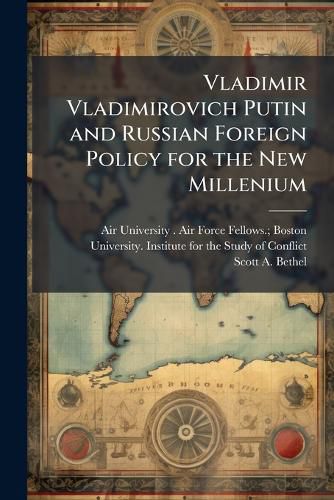Readings Newsletter
Become a Readings Member to make your shopping experience even easier.
Sign in or sign up for free!
You’re not far away from qualifying for FREE standard shipping within Australia
You’ve qualified for FREE standard shipping within Australia
The cart is loading…






This title is printed to order. This book may have been self-published. If so, we cannot guarantee the quality of the content. In the main most books will have gone through the editing process however some may not. We therefore suggest that you be aware of this before ordering this book. If in doubt check either the author or publisher’s details as we are unable to accept any returns unless they are faulty. Please contact us if you have any questions.
Russian foreign policy during 2001-2002 revealed an entirely new approach as President Vladimir Putin and his Foreign Minister, Igor Ivanov, expanded the scope of Russian external relations both in terms of numbers of nations and the depth of the relationships. The preceding administration of Boris Yeltsin had alienated many people both internally and externally and there was much to do to repair the damage. The events of 11 September vaulted the Russians into a position of prominence that Putin and Ivanov could not imagine possible. A fast and firm show of support for the United States by Putin and his promise to assist in the war against terrorism in any way put Moscow at the center of the war against terrorism, both as a regional hegemon and as a U.S. partner.
This work has been selected by scholars as being culturally important, and is part of the knowledge base of civilization as we know it. This work was reproduced from the original artifact, and remains as true to the original work as possible. Therefore, you will see the original copyright references, library stamps (as most of these works have been housed in our most important libraries around the world), and other notations in the work.
This work is in the public domain in the United States of America, and possibly other nations. Within the United States, you may freely copy and distribute this work, as no entity (individual or corporate) has a copyright on the body of the work.
As a reproduction of a historical artifact, this work may contain missing or blurred pages, poor pictures, errant marks, etc. Scholars believe, and we concur, that this work is important enough to be preserved, reproduced, and made generally available to the public. We appreciate your support of the preservation process, and thank you for being an important part of keeping this knowledge alive and relevant.
$9.00 standard shipping within Australia
FREE standard shipping within Australia for orders over $100.00
Express & International shipping calculated at checkout
This title is printed to order. This book may have been self-published. If so, we cannot guarantee the quality of the content. In the main most books will have gone through the editing process however some may not. We therefore suggest that you be aware of this before ordering this book. If in doubt check either the author or publisher’s details as we are unable to accept any returns unless they are faulty. Please contact us if you have any questions.
Russian foreign policy during 2001-2002 revealed an entirely new approach as President Vladimir Putin and his Foreign Minister, Igor Ivanov, expanded the scope of Russian external relations both in terms of numbers of nations and the depth of the relationships. The preceding administration of Boris Yeltsin had alienated many people both internally and externally and there was much to do to repair the damage. The events of 11 September vaulted the Russians into a position of prominence that Putin and Ivanov could not imagine possible. A fast and firm show of support for the United States by Putin and his promise to assist in the war against terrorism in any way put Moscow at the center of the war against terrorism, both as a regional hegemon and as a U.S. partner.
This work has been selected by scholars as being culturally important, and is part of the knowledge base of civilization as we know it. This work was reproduced from the original artifact, and remains as true to the original work as possible. Therefore, you will see the original copyright references, library stamps (as most of these works have been housed in our most important libraries around the world), and other notations in the work.
This work is in the public domain in the United States of America, and possibly other nations. Within the United States, you may freely copy and distribute this work, as no entity (individual or corporate) has a copyright on the body of the work.
As a reproduction of a historical artifact, this work may contain missing or blurred pages, poor pictures, errant marks, etc. Scholars believe, and we concur, that this work is important enough to be preserved, reproduced, and made generally available to the public. We appreciate your support of the preservation process, and thank you for being an important part of keeping this knowledge alive and relevant.